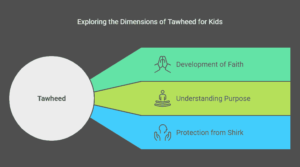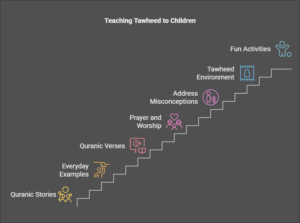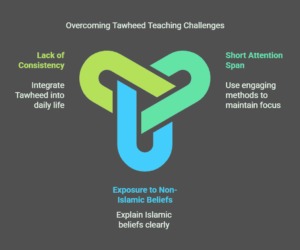Teaching your children Tawheed (Islamic monotheism) is one of the most important responsibilities of a Muslim parent. Tawheed is the foundation of Islam, emphasizing the belief in the oneness of Allah (SWT) as the sole Creator, Sustainer, and Protector of all things.
But how can you effectively teach your children about Tawheed in a way that resonates with their young hearts and minds? This guide provides practical strategies, tools, and examples to help parents instill the principles of Tawheed in their children, fostering a deep and lasting connection with Allah (SWT).
What is Tawheed, and Why Is It Important for Kids?

Tawheed is the belief in the absolute oneness of Allah (SWT) and is the essence of our faith. It teaches us that Allah alone deserves worship, He has no partners, and nothing is comparable to Him.
For children, learning Tawheed early lays the foundation for their understanding of Islam and strengthens their relationship with Allah throughout their lives. By teaching Tawheed:
- Children develop a strong sense of faith and reliance on Allah.
- They learn the purpose of their existence: to worship Allah (SWT).
- It protects them from shirk (associating partners with Allah) and clarifies their belief system.
Get started with our classes to Learn Quran Online for Kids
How to Teach Tawheed to Your Kids: Practical Steps

Teaching Tawheed doesn’t require complex explanations or formal lessons. It’s about embedding the concept into your child’s everyday life through simple, relatable, and consistent methods.
1. Start with Stories from the Quran and Sunnah
Children love stories, and storytelling is one of the most effective ways to teach Tawheed. Share stories of:
- The Prophets (peace be upon them):
- Teach about Prophet Ibrahim (AS) and his unwavering belief in Allah. Explain how he rejected idol worship and demonstrated the meaning of Tawheed.
- Narrate the story of Prophet Musa (AS) and how he relied on Allah to save the Children of Israel from Pharaoh.
- The Sahabah (companions of the Prophet):
- Highlight how the companions prioritized their faith and relied on Allah in all matters.
Tip: After telling a story, ask your child simple questions like, “What does this story teach us about Allah?”
2. Relate Tawheed to Everyday Situations
Make Tawheed a part of your child’s daily life by pointing out examples of Allah’s greatness and power.
- Examples in Nature:
- Show your child the beauty of the sky, the stars, and the trees. Teach them that Allah created everything and controls the universe.
- Say, “Who makes the rain fall and the flowers grow? It’s Allah, the Most Powerful.”
- Examples in Their Lives:
- When your child is sick, remind them to make dua to Allah for healing, explaining that medicine is just a means, but Allah is the ultimate Healer.
Key Message: Teach your child that Allah is the only One who provides for them, protects them, and answers their prayers.
3. Use Quranic Verses and Short Dhikr
Incorporate verses from the Quran and simple dhikr into your child’s routine.
- Teach them short surahs like Surah Al-Ikhlas, which beautifully encapsulates the concept of Tawheed:
“Say, ‘He is Allah, [Who is] One, Allah, the Eternal Refuge.’” (Quran 112:1-2) - Encourage them to say dhikr like:
- “La ilaha illallah” (There is no deity but Allah).
- “Subhanallah” (Glory be to Allah).
Explain the meanings of these phrases in simple terms, helping them understand the oneness and greatness of Allah.
4. Incorporate Tawheed into Prayer and Worship
- Teach the Shahada (Declaration of Faith):
- Begin by explaining the meaning of “la ilaha illa Allah Muhammadun Rasul Allah” and emphasize that there is no god but Allah.
- Encourage them to say it often and explain why it’s the most important statement for a Muslim.
- Teach Duas (Supplications):
- Help your child learn simple duas for daily activities (e.g., before eating, sleeping, or traveling).
- Explain that by making dua, we are directly asking Allah for help because He alone can answer our prayers.
5. Address Misconceptions Early
Children are naturally curious and may encounter ideas or concepts that contradict Tawheed, especially in non-Muslim environments. Use these opportunities to teach them the truth about Allah.
- If your child hears about mythical characters like Santa Claus or superheroes with powers, explain gently that only Allah has ultimate power and control.
- Correct their understanding when they say things like, “This lucky charm brought me good luck,” by reminding them that only Allah can bring benefit or harm.
Tip: Always approach these corrections with kindness and clarity to foster a positive learning environment.
6. Create a Tawheed-Focused Environment
Children learn by observing their surroundings, so create an environment that reflects Islamic values and principles.
- Be a Role Model: Show your reliance on Allah in your daily life by praying regularly, making dua, and showing gratitude.
- Avoid Negative Behaviors: Avoid superstitions, idolizing worldly things, or complaining excessively, as these behaviors contradict the principles of Tawheed.
7. Teach Through Fun Activities
Children learn best when they’re engaged in enjoyable activities.
- Tawheed Crafts and Projects: Create posters or crafts about Allah’s names and attributes.
- Quizzes and Games: Use simple quizzes or flashcards to reinforce their understanding of Tawheed.
- Interactive Apps and Videos: Many Islamic apps and YouTube channels have kid-friendly content to teach Tawheed.
Challenges in Teaching Tawheed and How to Overcome Them

1. Short Attention Span
Solution: Keep lessons short and engaging. Use stories, visuals, and interactive methods to capture their interest.
2. Exposure to Non-Islamic Beliefs
Solution: Address these influences early by explaining Islamic beliefs in a way they can understand. Encourage them to ask questions.
3. Lack of Consistency
Solution: Make Tawheed a regular part of daily conversations and activities, rather than a one-time lesson.
Get started with our Online Quran Classes for Kids
FAQs About Teaching Kids Tawheed
1. What is the best age to teach kids Tawheed?
You can start teaching Tawheed as early as 3-4 years old by using simple concepts and gradually building on them as they grow.
2. Do I need books to teach Tawheed?
Books can be helpful, but they’re not necessary. Storytelling, everyday examples, and interactive activities are equally effective.
3. How can I make Tawheed relatable to my kids?
Relate Tawheed to their daily lives by pointing out Allah’s signs in nature, teaching them duas, and encouraging gratitude toward Allah.
4. What if my child doesn’t seem interested in learning?
Be patient and use fun, engaging methods like stories, crafts, and games to spark their curiosity.
5. Are there online resources to help teach Tawheed?
Yes, platforms like The Quran Courses Academy and Islamic apps provide resources, videos, and lessons specifically designed for kids.
Start with our Online Islamic Studies Course
Conclusion: Start Teaching Tawheed Today
Teaching your kids Tawheed is a lifelong investment in their faith and character. By incorporating stories, everyday examples, and engaging activities, you can help your child develop a strong belief in the oneness of Allah (SWT).
💻 Explore online resources and classes with The Quran Courses Academy to make teaching Tawheed fun and effective for your children!



